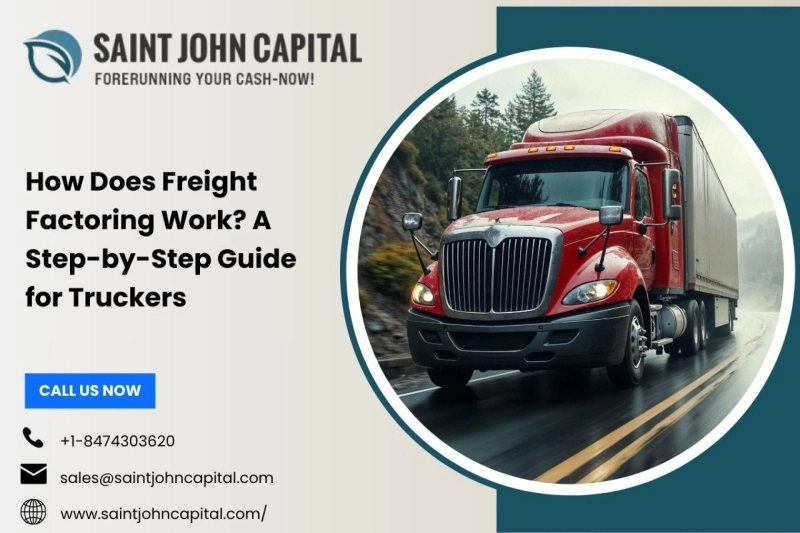Freight factoring is a form of financial service which allows trucking companies and owner-operators to convert their freight invoices which are not paid to them to be paid instantly. It is a widely adopted method to deal with cash flow so that truckers can receive payments in a short time without the payment terms of their customers taking effect.
This question of how does freight factoring work is a step-by-step explanation of how and why freight factoring works, pros and cons to freight invoice factoring service.
What is Freight Factoring?
The process of selling pending freight bills of trucking companies to third-party factoring organisations at a discount interest rate is what is referred to as freight factoring. The factoring company advances the trucking company a high percentage of the value of the invoice directly, usually within 24-48 hours and in the future collects the entire amount due to the customer. The service assists truckers in ensuring that they experience constant cash flow and can pay up imminent costs such as fuel, salaries, and repairs.
The Freight Factoring Process Step by Step
Here is the step by step understanding of the how does freight factoring work system:
1. Documents and Load Delivery
Your client drops off, and you pick up the freight. Once you accept the delivery, you receive such important documents as the signed bill of lading and rate confirmation. These are documents of proof of delivery, and they are required when the factoring company checks the invoice.
2. Factoring Company
Send in the invoice together with the signed BOL and rate confirmation to the factoring company. Most factoring firms also offer easy-to-use online portals or even mobile applications to upload this paperwork within minutes (right in your truck or in the office).
3. Checking and Authorising
The factoring firm confirms the invoice and delivery documents so that nothing is out of order and so that no lien or disputes are attached to the freight bill. They can also undertake a credit check on your customer to determine the payment risk of the customer.
4. Immediate Cash Advance
Upon approval, the factoring company may purchase your invoices and issue you a substantial amount of the invoice amount, usually anywhere between 85-98% and in most cases within 24 hours. The rest of the balance, less the fees, is paid when the factoring firm receives absolute payment from your customer.
5. Pick up at the Customer
The freight factoring company assumes the role of collecting payment from the customer. Perhaps, you do not have to chase payments anymore or be in charge of collection.
6. Settlement to You
Once your customer has paid the invoice in full, the factoring firm will take its cut (factoring discount) and send you the rest. The charge tends to average 2 6 per cent of the invoice value, and will vary depending on volume, credit profile and other considerations.
Advantages and Disadvantages of Freight Factoring Invoice
The following is the table of the pros and cons to freight invoice factoring from the previous blog, represented in the form of a table:
Advantages
Freight invoice factoring is accompanied by multiple benefits and a handful of disadvantages that are worth considering on the part of the truckers. On the flip side, it substantially enhances the cash flow as the company does not have to wait 30 days or even longer, like before, to get what is owed to it by its clients. Because it is not a loan, there is no debt/interest that is recorded on your balance sheet. This type of financing is also fairly quick and easy to apply, the process involving minimal paperwork as compared to traditional financing. It also enables trucking companies to concentrate on performing their main business operations since the factoring enterprise manages the collection of the payment, and various providers provide other benefits, such as fuel cards, credit checks, and back-office assistance.
Disadvantages
Freight factoring, however, does not come without a few drawbacks. The commissions, which are mostly measured as 2-6 per cent of the invoice cost, diminish your total income. This may impact your relationship with the client since now the customer will be paying the factoring company. Not all factoring arrangements can be done on short-term contracts or for low volumes of invoices, as some agreements need long-term arrangements. In ensuring that you consider the recourse factoring, you may be forced to refund the advance in case your customer defaults. Besides, advances can also vary with the credit rating of the customer, whereby you may only get less money upfront.
Reasons Why Truckers Use Freight Factoring?
Freight Factoring is being used by truckers for the following reasons:
- So that there is no interruption in the cash flows and business operations.
- To be able to spend on things such as fuel, truck maintenance, and driver salaries without having to wait till invoices are cleared.
- To raise financial stability and expand operation without using conventional debts.
- To get back-office assistance and credit management services.
Wrapping Up
Freight factoring is also a convenient and viable method of trucking businesses to speed up financial movement and run continuing movements. Knowing the details of the factoring process, its advantages and drawbacks, truckers would be able to make the right choices regarding the meaning of using the factoring services as a financial instrument.
As a trucker, you want to enhance your cash flow, but you do not keep track of the money your business owes you. A trucking invoice factoring company could be your solution to making sure you concentrate on what you are good at, which is driving and delivering.



